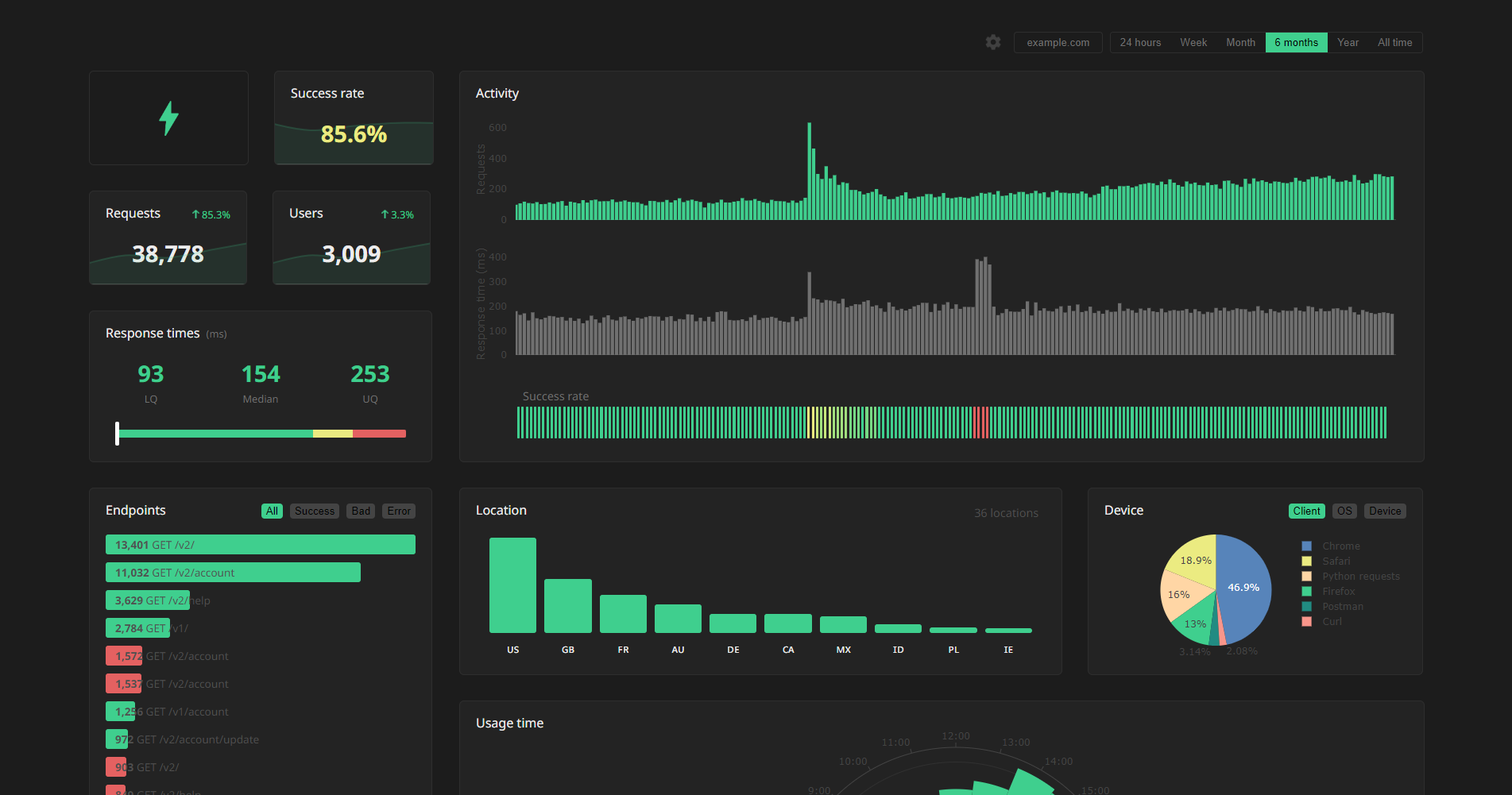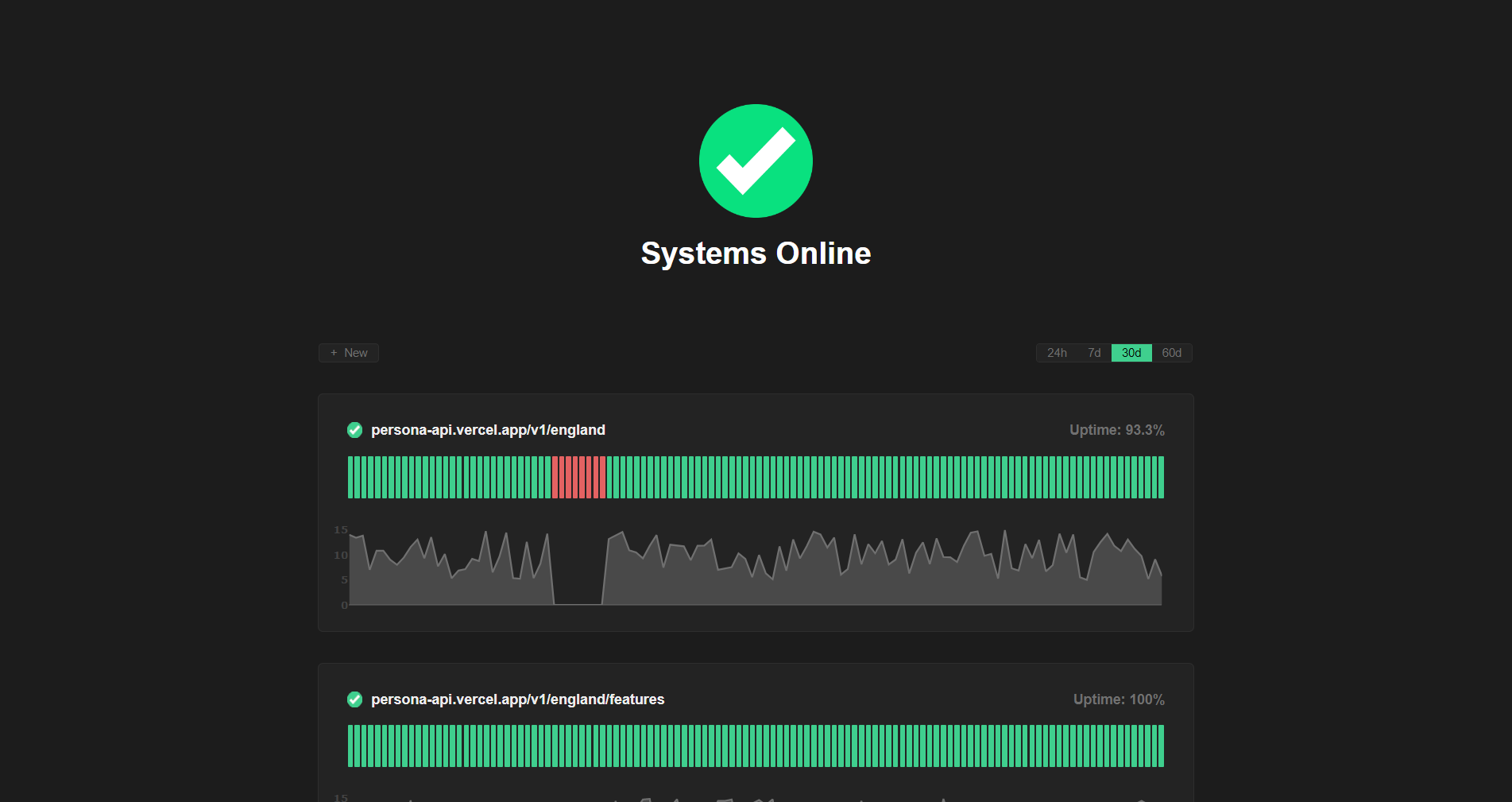
Security News
Static vs. Runtime Reachability: Insights from Latio’s On the Record Podcast
The Latio podcast explores how static and runtime reachability help teams prioritize exploitable vulnerabilities and streamline AppSec workflows.
node-api-analytics
Advanced tools
A free and lightweight API analytics solution, complete with a dashboard.
Head to apianalytics.dev/generate to generate your unique API key with a single click. This key is used to monitor your specific API and should be stored privately. It's also required in order to access your API analytics dashboard and data.
Add our lightweight middleware to your API. Almost all processing is handled by our servers so there is minimal impact on the performance of your API.
npm install node-api-analytics
import express from 'express';
import { expressAnalytics } from 'node-api-analytics';
const app = express();
app.use(expressAnalytics(<API-KEY>)); // Add middleware
app.get('/', (req, res) => {
res.send({message: 'Hello World!'});
});
app.listen(8080, () => {
console.log('Server listening at localhost:8080');
})
import fastify from 'Fastify';
import { useFastifyAnalytics } from 'node-api-analytics';
const fastify = Fastify();
useFastifyAnalytics(fastify, apiKey);
fastify.get('/', function (request, reply) {
reply.send({ message: 'Hello World!' });
})
fastify.listen({ port: 8080 }, function (err, address) {
console.log('Server listening at https://localhost:8080');
if (err) {
fastify.log.error(err);
process.exit(1);
}
})
import Koa from 'koa';
import { koaAnalytics } from 'node-api-analytics';
const app = new Koa();
app.use(koaAnalytics(<API-KEY>)); // Add middleware
app.use((ctx) => {
ctx.body = { message: 'Hello World!' };
});
app.listen(8080, () =>
console.log('Server listening at https://localhost:8080');
);
Your API will now log and store incoming request data on all routes. Your logged data can be viewed using two methods:
You can use the same API key across multiple APIs, but all of your data will appear in the same dashboard. We recommend generating a new API key for each additional API server you want analytics for.
Head to apianalytics.dev/dashboard and paste in your API key to access your dashboard.
Demo: apianalytics.dev/dashboard/demo

Logged data for all requests can be accessed via our REST API. Simply send a GET request to https://apianalytics-server.com/api/data with your API key set as X-AUTH-TOKEN in the headers.
import requests
headers = {
"X-AUTH-TOKEN": <API-KEY>
}
response = requests.get("https://apianalytics-server.com/api/data", headers=headers)
print(response.json())
fetch("https://apianalytics-server.com/api/data", {
headers: { "X-AUTH-TOKEN": <API-KEY> },
})
.then((response) => {
return response.json();
})
.then((data) => {
console.log(data);
});
curl --header "X-AUTH-TOKEN: <API-KEY>" https://apianalytics-server.com/api/data
You can filter your data by providing URL parameters in your request.
page - the page number, with a max page size of 50,000 (defaults to 1)date - the exact day the requests occurred on (YYYY-MM-DD)dateFrom - a lower bound of a date range the requests occurred in (YYYY-MM-DD)dateTo - a upper bound of a date range the requests occurred in (YYYY-MM-DD)hostname - the hostname of your serviceipAddress - the IP address of the clientstatus - the status code of the responselocation - a two-character location code of the clientuser_id - a custom user identifier (only relevant if a getUserID mapper function has been set)Example:
curl --header "X-AUTH-TOKEN: <API-KEY>" https://apianalytics-server.com/api/data?page=3&dateFrom=2022-01-01&hostname=apianalytics.dev&status=200&user_id=b56cbd92-1168-4d7b-8d94-0418da207908
Custom mapping functions can be assigned to override the default behaviour and define how values are extracted from each incoming request to better suit your specific API.
import express from 'express';
import { expressAnalytics, Config } from 'node-api-analytics';
const app = express();
const config = new Config();
config.getIPAddress = (req) => {
return req.headers["X-Forwarded-For"];
}
config.getUserAgent = (req) => {
return req.headers["User-Agent"];
}
app.use(expressAnalytics(<API-KEY>, config)); // Add middleware
import Fastify from 'fastify';
import { fastifyAnalytics, Config } from 'node-api-analytics;
const fastify = Fastify();
const config = new Config();
config.getIPAddress = (req) => {
return req.headers["X-Forwarded-For"];
}
config.getUserAgent = (req) => {
return req.headers["User-Agent"];
}
fastify.addHook('onRequest', fastifyAnalytics(<API-KEY>, config)); // Add middleware
import Koa from "koa";
import { koaAnalytics, Config } from "node-api-analytics";
const app = new Koa();
const config = new Config();
config.getIPAddress = (req) => {
return req.headers["X-Forwarded-For"];
}
config.getUserAgent = (req) => {
return req.headers["User-Agent"];
}
app.use(koaAnalytics(<API-KEY>, config)); // Add middleware
By default, API Analytics logs and stores the client IP address of all incoming requests made to your API and infers a location (country) from each IP address if possible. The IP address is used as a form of client identification in the dashboard to estimate the number of users accessing your service.
This behaviour can be controlled through a privacy level defined in the configuration of the API middleware. There are three privacy levels to choose from 0 (default) to a maximum of 2. A privacy level of 1 will disable IP address storing, and a value of 2 will also disable location inference.
Privacy Levels:
0 - The client IP address is used to infer a location and then stored for user identification. (default)1 - The client IP address is used to infer a location and then discarded.2 - The client IP address is never accessed and location is never inferred.const config = new Config();
config.privacyLevel = 2; // Disable IP storing and location inference
With any of these privacy levels, there is the option to define a custom user ID as a function of a request by providing a mapper function in the API middleware configuration. For example, your service may require an API key sent in the X-AUTH-TOKEN header field that can be used to identify a user. In the dashboard, this custom user ID will identify the user in conjunction with the IP address or as an alternative.
const config = new Config();
config.getUserID = (req) => {
return req.headers["X-AUTH-TOKEN"] ?? '';
}
All data is stored securely in compliance with The EU General Data Protection Regulation (GDPR).
For any given request to your API, data recorded is limited to:
Data collected is only ever used to populate your analytics dashboard. All stored data is pseudo-anonymous, with the API key the only link between you and your logged request data. Should you lose your API key, you will have no method to access your API analytics.
At any time you can delete all stored data associated with your API key by going to apianalytics.dev/delete and entering your API key.
API keys and their associated logged request data are scheduled to be deleted after 6 months of inactivity.
Active API monitoring can be set up by heading to apianalytics.dev/monitoring to enter your API key. Our servers will regularly ping chosen API endpoints to monitor uptime and response time.

Contributions, issues and feature requests are welcome.
git checkout -b my-new-feature)git commit -am 'Add some feature')git push origin my-new-feature)If you find value in my work consider supporting me.
Buy Me a Coffee: https://www.buymeacoffee.com/tomdraper
PayPal: https://www.paypal.com/paypalme/tomdraper
FAQs
Monitoring and analytics for node API applications.
The npm package node-api-analytics receives a total of 27 weekly downloads. As such, node-api-analytics popularity was classified as not popular.
We found that node-api-analytics demonstrated a healthy version release cadence and project activity because the last version was released less than a year ago. It has 1 open source maintainer collaborating on the project.
Did you know?

Socket for GitHub automatically highlights issues in each pull request and monitors the health of all your open source dependencies. Discover the contents of your packages and block harmful activity before you install or update your dependencies.

Security News
The Latio podcast explores how static and runtime reachability help teams prioritize exploitable vulnerabilities and streamline AppSec workflows.

Security News
The latest Opengrep releases add Apex scanning, precision rule tuning, and performance gains for open source static code analysis.

Security News
npm now supports Trusted Publishing with OIDC, enabling secure package publishing directly from CI/CD workflows without relying on long-lived tokens.